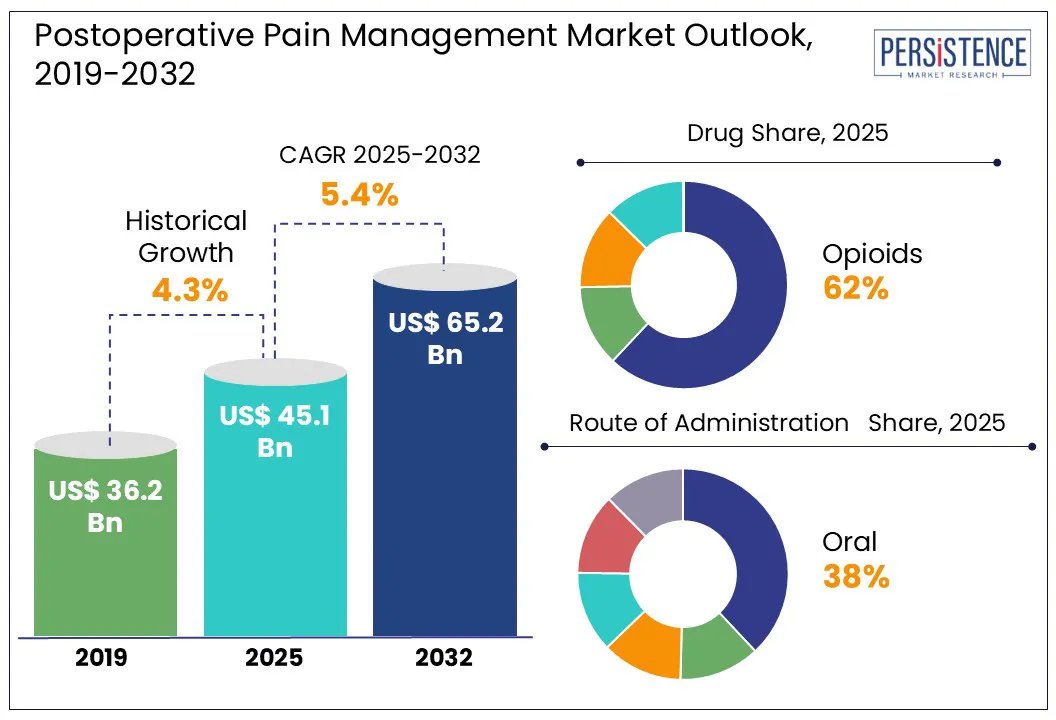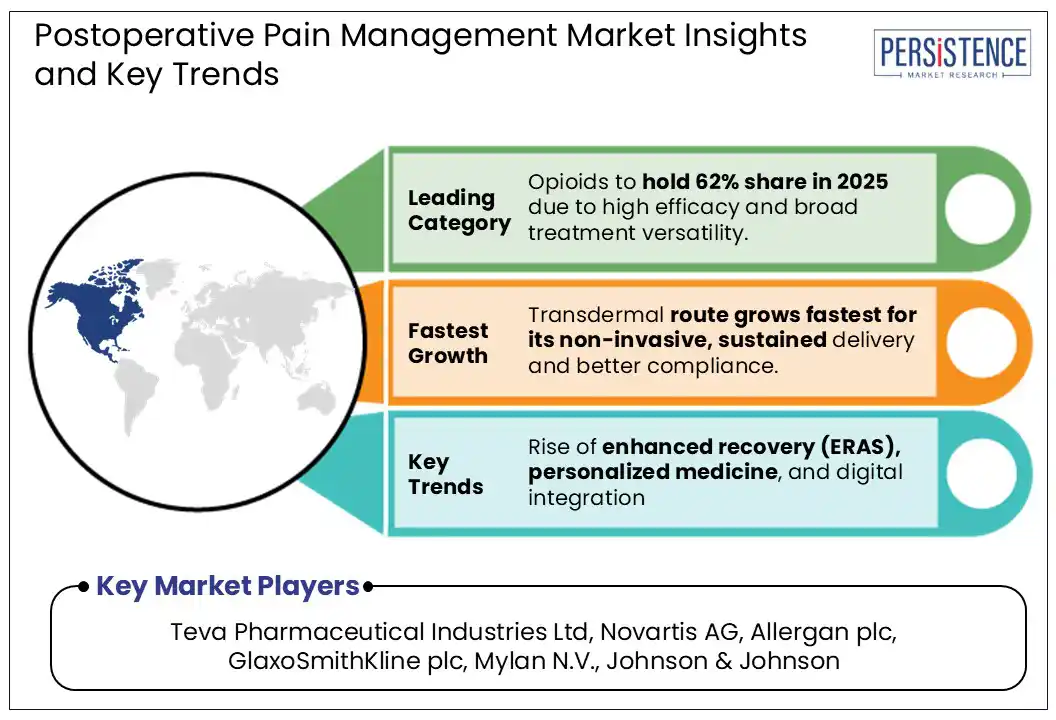ID: PMRREP24259| 193 Pages | 20 Jun 2025 | Format: PDF, Excel, PPT* | Healthcare

Global postoperative pain management market size is likely to be valued at US$ 45.13 Bn in 2025 and is estimated to reach US$ 65.22 Bn, at a CAGR of 5.4% during the forecast period 2025−2032
Cancer cases, post-pandemic elective operations, delayed elderly recoveries, and rising demand for pain relief solutions are contributing to the postoperative pain management industry's growth. Even while opioid and non-opioid analgesics have evolved, the COVID-19 pandemic has made enhanced pain treatment even more necessary, despite the difficulty of striking a balance between side effects and efficacy.
In October 2024, the FDA authorized OLINVYK for the treatment of acute pain in adults, opening the door for novel painkillers with enhanced effectiveness and fewer adverse effects. Combining several pain management strategies, or multimodal analgesia, is becoming popular as a way to improve postoperative pain management. Companies like Pfizer, Johnson & Johnson, and AbbVie are leading the way in developing unique analgesic therapies, leveraging research and development to meet diverse patient needs.

Key Highlights of the Market
|
Market Attributes |
Key Insights |
|
Postoperative Pain Management Market Size (2025E) |
US$ 45.13 Bn |
|
Projected Market Value (2032F) |
US$ 65.22 Bn |
|
Global Market Growth Rate (CAGR 2025 to 2032) |
5.4% |
|
Historical Market Growth Rate (CAGR 2019 to 2023) |
4.3% |
In 2025, North America, with the U.S. leading the region, holds a dominant position in the postoperative pain management market, accounting for 46% of share. North America is anticipated to record a CAGR of 5.2% from 2025 to 2032 due to efforts to lessen opioid dependency.
Developments, coupled with a strong drug pipeline from companies like Purdue Pharma and Johnson & Johnson, are set to drive increased adoption of effective and safer postoperative pain relief solutions.
In 2025, Asia Pacific is set to lead with 28.7% share, driven by government investments in healthcare infrastructure and medical innovation, in emerging economies like India and China. The region’s postoperative pain management market is projected to report a CAGR of 7.4% from 2025 to 2032.
The development of long-acting and sustained-release formulations, such as non-opioid analgesics and extended-release opioids, which provide prolonged pain relief while minimizing dosing frequency, is driving the postoperative pain management market's notable growth in Asia Pacific. For instance,
Opioids are the preferred choice for managing postoperative pain due to their efficacy and versatility, with a market share of 62% anticipated in 2025, making these a preferred choice for healthcare providers. Although opioids are used to treat acute pain in 75% of significant surgeries, the healthcare sector is looking for alternatives due to worries about addiction and negative effects. For instance,
Companies such as Purdue Pharma and Endo International are developing opioid alternatives to reduce abuse risks, yet opioids remain the dominant market for postoperative pain management due to their immediate relief capabilities.
The oral route of postoperative pain treatment is becoming immensely popular since it is cost-effective, easy to administer, and patient-complies. In 2025, the oral route of medication is expected to hold 38% of the global market.
Oral drugs are a popular choice for long-term pain management since they do not require injections and lessen the strain on medical facilities. Oral medicines are used in around 60% of postoperative pain treatment cases. For instance,
Novel oral analgesics with improved effectiveness and fewer adverse effects are being developed by companies such as Pfizer and Johnson & Johnson.
Increasing number of surgical procedures globally, especially among aging populations, has raised the demand for novel pain management solutions.
Patient satisfaction influences pain management protocols, especially in minimally invasive surgeries, requiring procedure-specific approaches like long-acting local anesthetics and novel drug delivery systems to reduce opioid dependency. Companies like Pacira BioSciences have been at the forefront, offering alternatives such as EXPAREL, a long-acting bupivacaine product that provides sustained pain relief without the need for opioids.
Multimodal pain management strategies, combining drug classes, and digital health technologies like mobile apps and telemedicine are enhancing efficacy and reducing opioid use risks. Research into non-pharmacological methods, like nerve blocks and regional anesthesia, is advancing, offering cost-effective solutions to reduce hospital stays and improve patient recovery.

The global postoperative pain medication market recorded a CAGR of 4.3% in the historical period from 2019 to 2024. Increased road accidents and trauma injuries are predicted to increase the need for postoperative pain management. For example,
Rising need for pain management medications is driving market expansion, with 100 million operations performed in the U.S. each year, as well as the increasing prevalence of cancer therapy-associated pain and the growing pediatric and elderly population having different procedures. Demand for pain management is estimated to record a considerable CAGR of 5.4% during the forecast period between 2025 and 2032.
Rising Surgical Procedures to Propel Demand for Pain Management Solutions
The need for more difficult operations due to the aging population and the rise in surgical procedures worldwide have caused the postoperative pain management industry to grow in the forecast period. For instance,
Purdue Pharma, Johnson & Johnson, and Pfizer are focusing on developing innovative analgesic solutions, including non-opioid alternatives, to alleviate postoperative pain and ensure patient safety. FDA approvals of drugs like OLINVYK and Zynrelef enhance pain management, driven by increasing surgical interventions and the need for innovative strategies.
Rising Emphasis on Palliative Care to Create New Approaches
In order to effectively manage pain, the healthcare industry is moving toward comprehensive palliative care approaches that incorporate non-pharmacological and pharmaceutical techniques. Growth of palliative care services and facilities, such as the creation of a 10-bed pediatric palliative care wing at Sparsh Hospice in Hyderabad, India, is indicative of the change.
Increasing acknowledgment of palliative care's significance in controlling post-operative pain and enhancing patients' quality of life throughout recuperation phases reflects the shift. For instance,
Patients may maintain active, satisfying lifestyles while successfully managing their pain because of this all-encompassing approach to pain treatment, which blends support structures with sophisticated care planning.
Concerns Regarding Overuse of Opioids May Negatively Affect the Industry
Distresses about the misuse of opioids are impacting the postoperative pain management market. For instance,
Non-opioid options, such as EXPAREL, a local anesthetic that relieves pain without the hazards of opioids, are being adopted by pharmaceutical firms and healthcare practitioners. In order to promote multimodal pain management that combines opioids with non-opioid medicines such as acetaminophen, NSAIDs, and nerve blocks, the FDA has authorized oliceridine for the treatment of acute pain. For example,
Rising Research and Development Activities to Enhance Personalized Medication
Research and development in pharmacogenomics is transforming postoperative care by enabling personalized pain management protocols based on patient genetics and risk factors, improving efficacy, and reducing adverse effects. For example,
Companies such as Genemarkers and OneOme are integrating genetic testing into clinical workflows for precise medication selection and dosing, considering risk factors like opioid dependency history and surgical type. Cleveland Clinic utilizes multimodal approaches, including pharmacogenomics and non-pharmacological therapies, to enhance postoperative pain control, aligning with regulatory initiatives like the FDA's precision medicine push.
Hospital Pharmacies to Cater to the Multitude of Pain Medications
In 2025, hospital pharmacists are envisioned to account for 63.4% of the postoperative pain treatment market, because they have a wide range of painkillers on hand and can quickly give patients following surgery access to pain medications. High-risk drugs like opioids, act as centralized distribution centers while upholding stringent inventory management and legal compliance.
The pharmacies' integration into healthcare facilities enables pharmacists and healthcare professionals to work together seamlessly to create individualized pain management strategies. In order to ensure a steady supply for both scheduled and emergency surgical procedures, they also keep sufficient stock levels of both regularly used and specialist pain management narcotics.
Key participants in the postoperative pain management industry are increasingly taking part in strategic mergers and acquisitions as well as other consolidation tactics, such as the launch of new medications. Leading manufacturers are actively working on the development of cutting-edge technology and creative solutions in an attempt to improve their product offers globally. In addition to strengthening their market presence, these initiatives seek to improve patient treatment options and increase their ability to compete by utilizing synergies.
Recent Industry Developments
The Global market is estimated to increase from US$ 45.1 Bn in 2025 to US$ 65.2 Bn in 2032.
Rising surgical volumes, non-opioid innovation, aging population, enhanced recovery protocols, and demand for safer, personalized pain therapies drive growth.
The market is projected to record a CAGR of 5.4% during the forecast period from 2025 to 2032.
Opportunities include non-opioid drug development, regional market expansion, digital health integration, personalized therapies, and enhanced postoperative recovery program adoption.
Major players include Teva Pharmaceutical Industries Ltd, Novartis AG, Allergan plc, GlaxoSmithKline plc, Mylan N.V., Johnson & Johnson and Others.
|
Attributes |
Details |
|
Forecast Period |
2025 to 2032 |
|
Historical Data Available for |
2019 to 2024 |
|
Market Analysis |
US$ Billion for Value |
|
Key Regions Covered |
|
|
Key Market Segments Covered |
|
|
Key Companies Profiled in the Report |
|
|
Report Coverage |
|
|
Customization and Pricing |
Available upon request |
By Drug
By Route of Administration
By Prescription Type
By Distribution Channel
By Region
Delivery Timelines
For more information on this report and its delivery timelines please get in touch with our sales team.
About Author